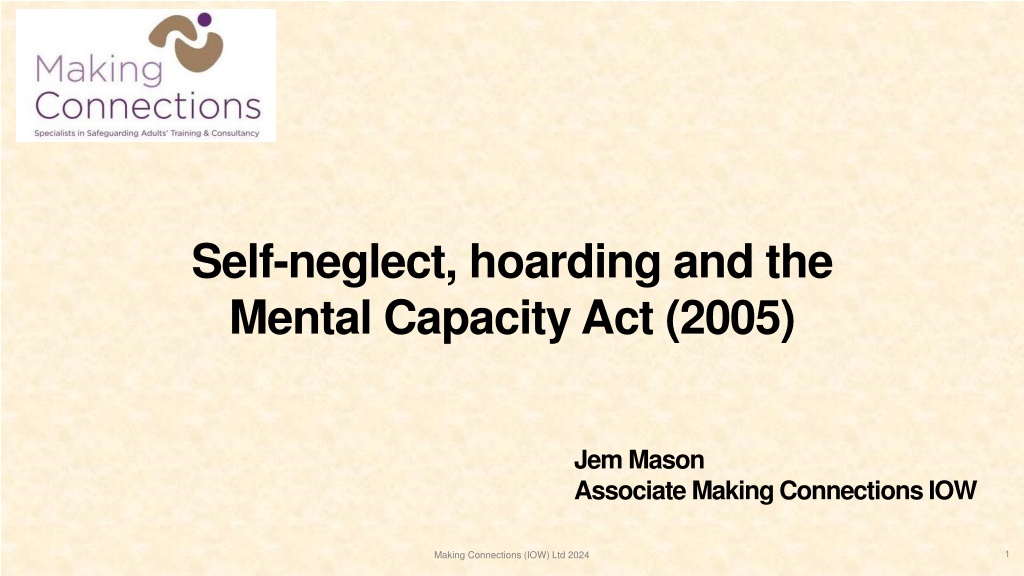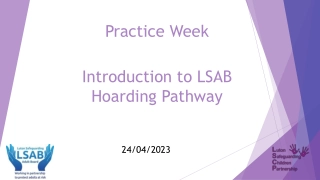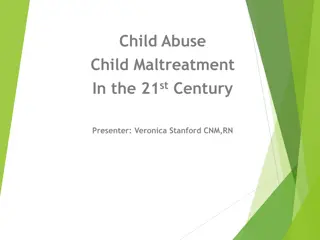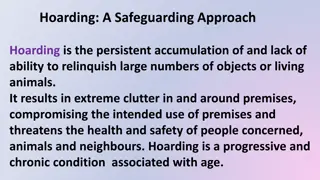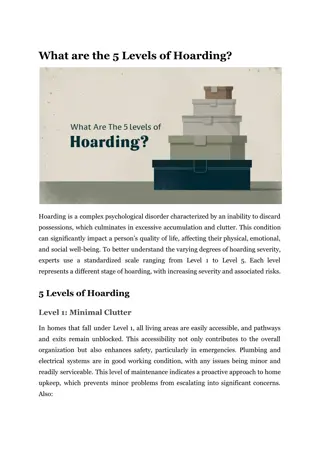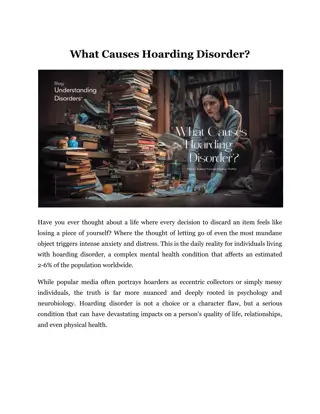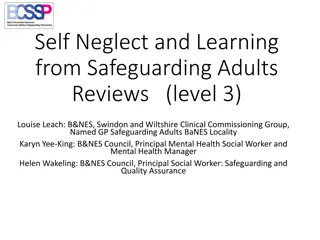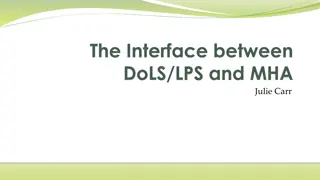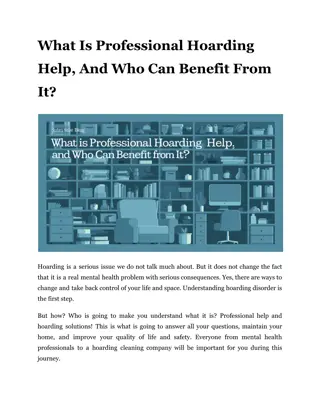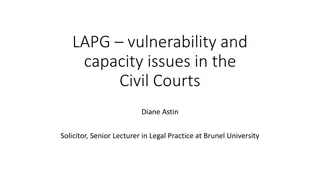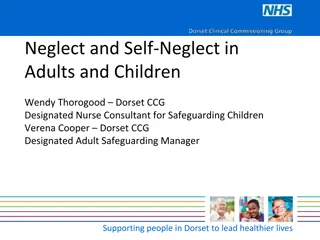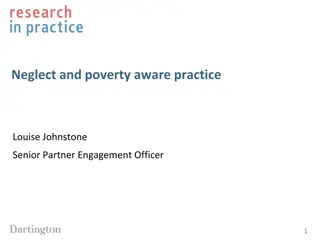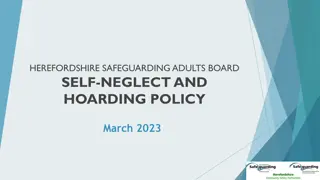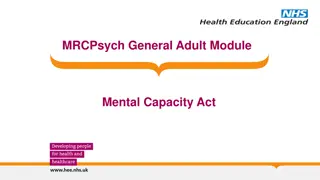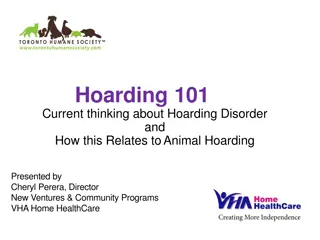Understanding Self-Neglect, Hoarding, and the Mental Capacity Act (2005)
Self-neglect and hoarding are complex issues often intertwined with mental capacity challenges. The Mental Capacity Act (2005) outlines capacity assessments, decision-making criteria, and challenges faced by professionals in safeguarding individuals. Recognizing the need for trauma-informed care in exploring self-neglect is crucial, as it may coexist with other concerns like substance misuse or treatment refusal. The Act defines lack of capacity and emphasizes the importance of information for decision-making. Exploring the implications of here-and-now versus there-and-then decisions, as well as executive function fluctuations, provides insight into managing these complex situations effectively.
Download Presentation

Please find below an Image/Link to download the presentation.
The content on the website is provided AS IS for your information and personal use only. It may not be sold, licensed, or shared on other websites without obtaining consent from the author. Download presentation by click this link. If you encounter any issues during the download, it is possible that the publisher has removed the file from their server.
E N D
Presentation Transcript
Self-neglect, hoarding and the Mental Capacity Act (2005) Jem Mason Associate Making Connections IOW 1 Making Connections (IOW) Ltd 2024
Self-neglect and hoarding Two separate matters that are often found in parallel but can exist separately. Self-neglect recognised as a safeguarding matter under Care Act (2014) s 42. Hoarding disorder is a diagnosable mental health issue. Self-neglect should always be explored on a background of trauma informed practice. Self-neglect often coexists with other concerns e.g. care or treatment refusal, alcohol or substance misuse, dysregulated behaviour. 2 Making Connections (IOW) Ltd 2024
Challenges for MCA (2005) Assessing capacity where it is difficult to gain access to or engagement from the person. Propensity of professionals to frame issues as a life choice or unwise decision. Finding best interest outcomes that can apply practicable risk management in a situation where the person is unlikely to cooperate. Overlap between property and affairs and health and welfare matters. 3 Making Connections (IOW) Ltd 2024
The definition of a Lack of Capacity a person lacks capacity in relation to a matter if at the material time he is unable to make a decision for himself in relation to the matter because of an impairment of, or a disturbance in the functioning of, the mind or brain MCA (2005) s 2(1) 4 Making Connections (IOW) Ltd 2024
the matter The information relevant to a decision includes information about the reasonably foreseeable consequences of (a) deciding one way or another, or (b) failing to make the decision. 5 Making Connections (IOW) Ltd 2024
the material time Here and now decisions Consent to care and/or treatment Consent to a safeguarding action plan There and then decisions Managing my finances Managing my health needs Managing my property 6 Making Connections (IOW) Ltd 2024
Executive Function Fluctuation Can I work here and now with the reality of there and then What is the picture across a period of time (longitudinal) 7 Making Connections (IOW) Ltd 2024
an impairmentor a disturbance because of Essential to establish this link. Not just interference but rendering the person unable to decide. A diagnosis Contemporaneous evidence Evidence of person-centred support Non-interference by external factors 8 Making Connections (IOW) Ltd 2024
Good recording Be clear about the decision. Be clear about the relevant information used. Identify clear choices. What steps you have taken to support decision making. The timing of the assessment, single or longitudinal. Describe where any of the four functions are breaking down Provide evidence of impairment or disturbance. Make a clear link between the impairment and function. Make a clear statement about your reasonable belief. 9 Making Connections (IOW) Ltd 2024
Protection from liability s 5(1) A statutory defence not a power. (a) before doing the act, D takes reasonable steps to establish whether P lacks capacity in relation to the matter in question, and (b)when doing the act, D reasonably believes (i) that P lacks capacity in relation to the matter, and (ii) that it will be in P's best interests for the act to be done. 10 Making Connections (IOW) Ltd 2024
Necessary and Proportionate The greater the restriction of freedom the greater the burden to demonstrate necessity and proportionality. Necessary means the action will prevent some harm coming to a person; or prevent a serious deterioration in their condition. Proportionate means it is sufficient to address the likelihood and seriousness of harm the person will face. 11 Making Connections (IOW) Ltd 2024
Welfare and autonomy How likely is the person to engage with you on the matter of their welfare? How immediate and serious is the risk to life or wellbeing? How long has the person lived like this? Are there any recent changes that suggest the current situation would not be sustained? Does the person have any personal strategies for their safety, even poor ones? 12 Making Connections (IOW) Ltd 2024
Reasonable belief = Following the checklist + Risk assessing necessity + Seeking proportionality (less restrictive alternatives) + Engaging with opposing views 13 Making Connections (IOW) Ltd 2024
Reasonable belief = Best Interests Capital Wishes and Feelings Best Interests Triangle Welfare Duty 14 Making Connections (IOW) Ltd 2024
Jeanette Jeanette lives in her own detached bungalow. Police were recently called to the property following a disturbance in which Jeanette was arguing with her neighbour. On attending the property, the officers were able to calm Jeanette and accompany her into her house. They later sent a notice to the multi-agency safeguarding team describing Jeanette s circumstances: ..unkempt, dishevelled, her hair was messy and unclean, and her appearance suggests poor personal care. Inside the house, the bathroom was full and there was nowhere to wash. There are two dogs in the property, the hallway was difficult to access, and the kitchen was completely cluttered with food, batteries and other belongings stacked high on all work surfaces, the floor and sink. There appeared to be no heating or hot water in the address. The conservatory was piled high with clutter and household objects and clothing and not accessible, the sitting room was not accessible as it was full floor to ceiling with furniture and boxes. The property is unacceptable for any person or animal to live in and likely poses a serious fire risk. Initial contact is made by the multi-agency safeguarding team to consider if the section 42 criteria have been met. Jeanette said that the police officers had caught her on a bad day and that she was intending to get a cleaning company in to help her and she was trying to find a plumber who could come and fix her boiler. 15 Making Connections (IOW) Ltd 2024
Roger Roger is an older gentleman and lives in a ground floor apartment rented from a housing association. The apartment has one combined bedroom/sitting room, a small kitchenette and a wet-room style bathroom. Roger s daughter lives a considerable distance away and contacted the local authority saying she can t get to see her dad but had some concerns for his ability to care for himself. She suspects he may have some kind of dementia as he seems increasingly confused, agitated and forgetful on the telephone. Unable to contact Roger, a senior case worker makes a visit. Roger will not open the front door but is willing to talk to him if he stands at a doorway around the back. Roger is on his bed in his pyjamas and doesn t not look clean. The worker notices what could be faeces on the floor and a very strong odour from property. There is no carpet, and the walls look damp. Amongst the rubbish on the floor there are plates of mouldy food, beer cans and a large pile of unopened letters. There is an electric fire on and a large puddle of water on the floor which extends from the bathroom door. The floor looks slippery. There are bags of rubbish in the yard which have been attacked by rodents. The worker asks Roger if he thinks he needs any help; Roger says he is fine he is just naturally a bit messy and he is waiting for his daughter to come and visit to help him clear up. Roger says he doesn t need any kind of assessment or support, he thanks the worker for calling but says he doesn t need to come again. 16 Making Connections (IOW) Ltd 2024
